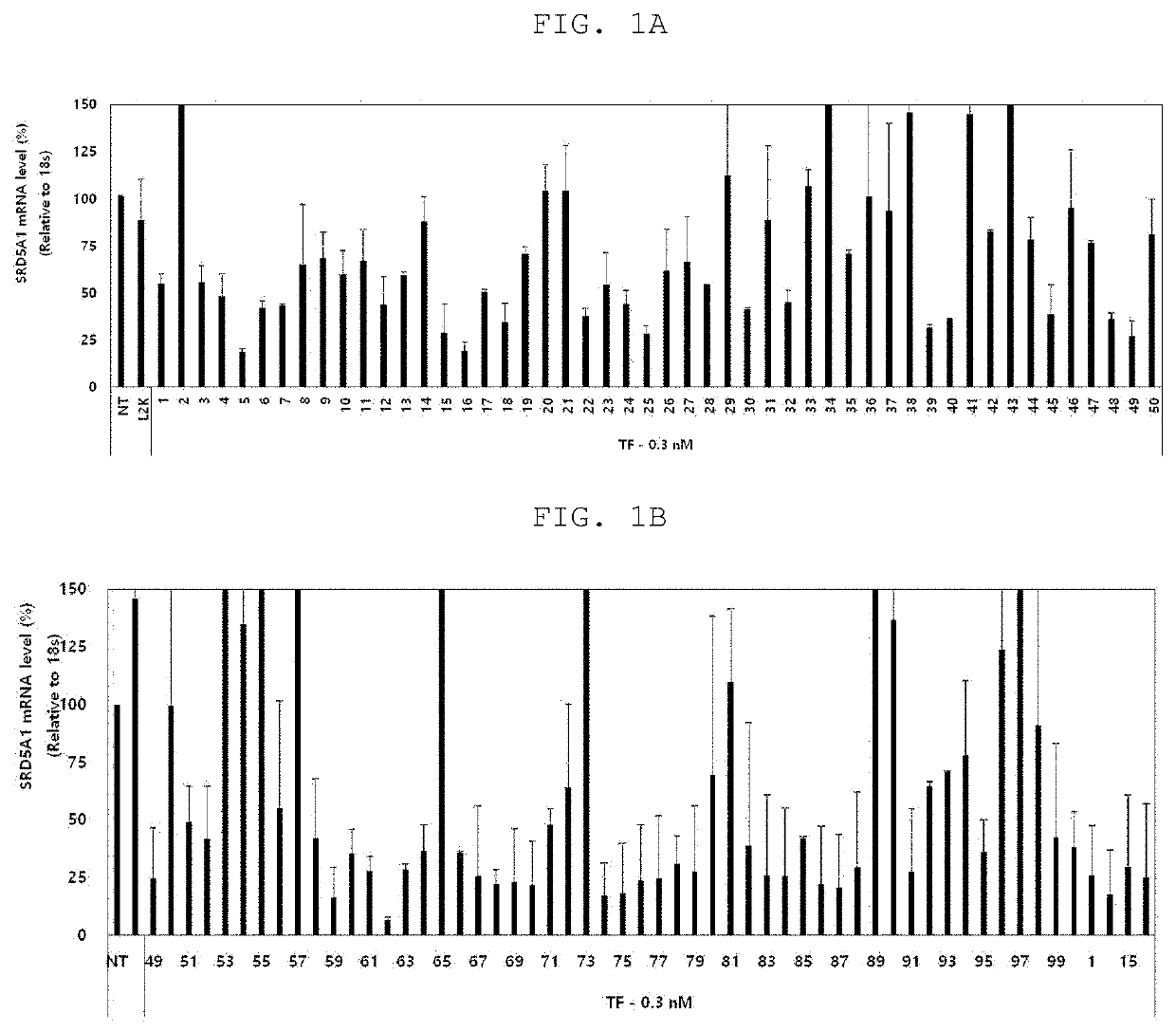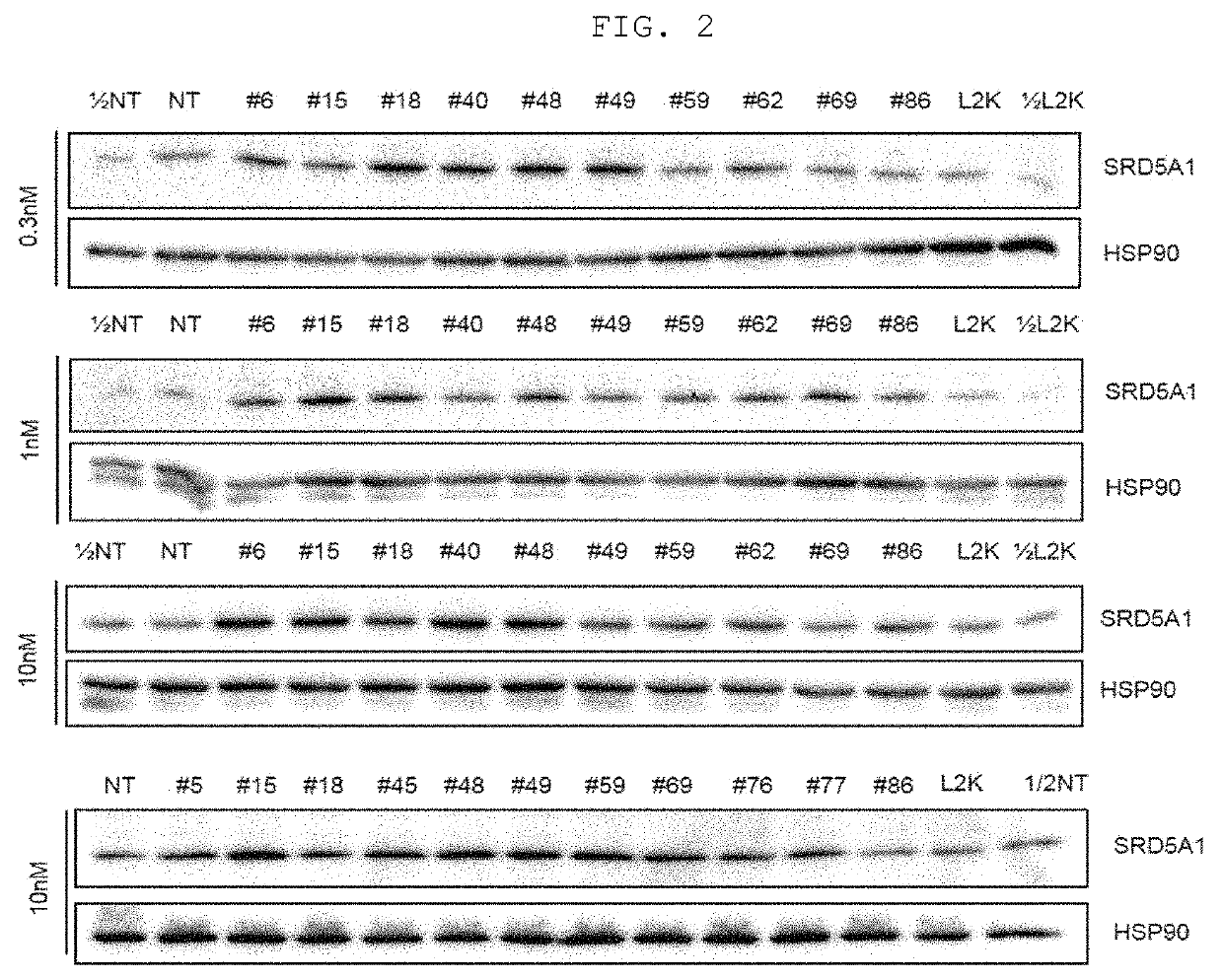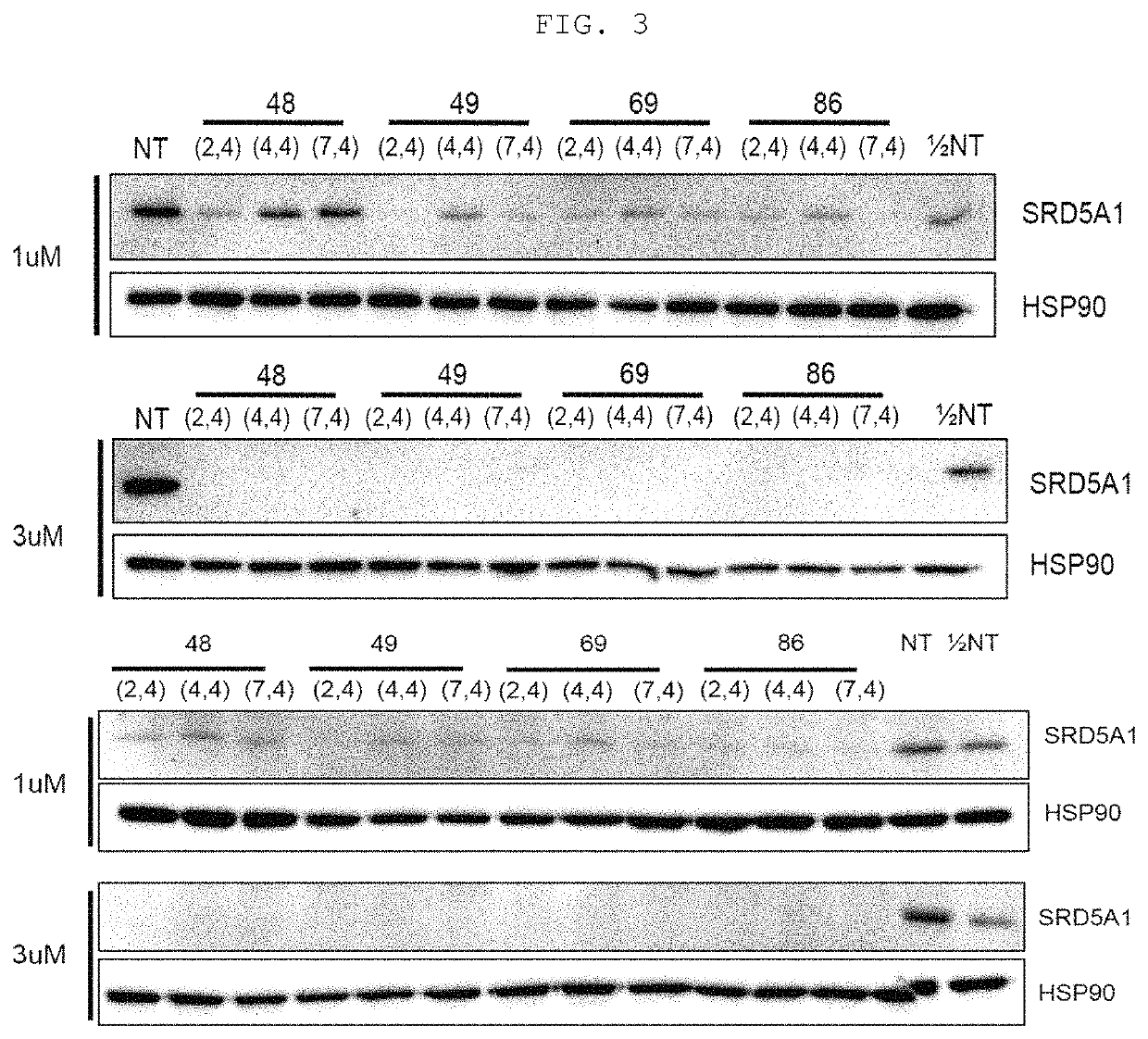Asymmetric siRNA for inhibiting expression of male pattern hair loss target gene
a technology of asymmetric sirna and target gene, which is applied in the direction of peptides, enzymology, drug compositions, etc., can solve the problems of fetal malformation, inability to inhibit the action of estrogen by excessively secreted androgens, and inability to carry out the effect of estrogen
- Summary
- Abstract
- Description
- Claims
- Application Information
AI Technical Summary
Benefits of technology
Problems solved by technology
Method used
Image
Examples
example 1
[Example 1] Screening for 100 Kinds of RNAi-Inducing Double-Stranded Nucleic Acid Molecules Targeting SRD5A1
[0072]To obtain high-efficiency RNAi-inducing double-stranded nucleic acid molecules targeting SRD5A1, the target sequence of the SRD5A1 gene was selected and then asiRNA was designed. The asiRNA structure is different from that of generally known siRNAs, and thus when the nucleotide sequences of asiRNA are designed using a general siRNA design program, it may be somewhat difficult to design an optimized asiRNA. Therefore, asiRNA was constructed by the following method. An NCBI db search was used to obtain information on the SRD5A1 gene (mRNA Accession Number: NM_001047.3, NM_001324322.1, NM_001324323.1), which is the target gene pertaining to male pattern hair loss (androgenetic hair loss). For subsequent animal experiments, nucleotide sequences were secured in consideration of the nucleotide sequence homology with mice, and then 100 kinds of asiRNA were designed according to...
example 2
[Example 2] Screening for RNAi-Inducing Double-Stranded Nucleic Acid Molecules Targeting SRD5A1
[0074]To confirm gene inhibitory efficiency at the mRNA level, 100 selected kinds of asiRNA were transfected into a HuH-7 cell line at a concentration of 0.3 nM, and qRT-PCR was performed to measure the expression level of SRD5A1 mRNA.
[0075]The HuH-7 cell line was cultured in Dulbecco's Modified Eagle's Medium (DMEM, Gibco) containing 10% fetal bovine serum (FBS, Gibco) and 100 units / ml of penicillin 100 μg / ml of streptomycin. HuH-7 cells were seeded in a 96-well plate at a density of 5×103 cells / well, and a reverse transfection experiment was conducted using asiRNA (0.3 nM, OliX Inc.) and Lipofectamine 2000 (1 μl / ml, Invitrogen Inc.) in Opti-MEM (a total volume of 100 μl) in accordance with Invitrogen's protocol. After 24 hours, RNA purification and cDNA synthesis were performed in accordance with a basic protocol provided by TOYOBO SuperPrep, the expression level of the SRD5A1 gene was e...
example 3
[Example 3] 16 Kinds of Cp-asiRNA Targeting SRD5A1 Gene and Having Self Cell-Penetrating Ability
[0077]SRD5A1 cp-asiRNAs (a total of 16 strands) were designed by applying three modification patterns to 4 kinds (in Table 1, No. 48, 49, 69, and 86) of asiRNA targeting SRD5A1 according to the number and position of 2′OMe (methyl), phosphorothioate bonds (PS), and cholesterol, and then synthesized by OliX Inc. (Korea). cp-asiRNA enhances endocytosis efficiency and stability and thus may penetrate through the cell membrane with high efficiency without the aid of a delivery vehicle to thereby inhibit target gene expression. The synthesized sense and antisense strand RNA oligonucleotides were annealed at 95° C. for 2 minutes through incubation at 37° C. for 1 hour, and cp-asiRNAs annealed by 10% polyacrylamide gel electrophoresis (PAGE) were confirmed by a UV transilluminator.
[0078]
TABLE 216 strands of cp-asiRNA nucleotide sequencestargeting SRD5A1No.NameSequence (5′-->3′) 1SRD5A1cp-mUUmAUm...
PUM
| Property | Measurement | Unit |
|---|---|---|
| volume | aaaaa | aaaaa |
| volume | aaaaa | aaaaa |
| volume | aaaaa | aaaaa |
Abstract
Description
Claims
Application Information
 Login to View More
Login to View More - R&D
- Intellectual Property
- Life Sciences
- Materials
- Tech Scout
- Unparalleled Data Quality
- Higher Quality Content
- 60% Fewer Hallucinations
Browse by: Latest US Patents, China's latest patents, Technical Efficacy Thesaurus, Application Domain, Technology Topic, Popular Technical Reports.
© 2025 PatSnap. All rights reserved.Legal|Privacy policy|Modern Slavery Act Transparency Statement|Sitemap|About US| Contact US: help@patsnap.com



